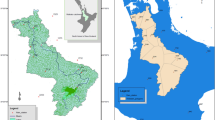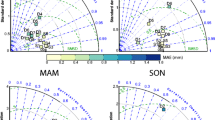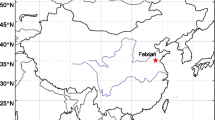Abstract
Large-scale temperature projections need to be downscaled to river basin scale to facilitate a regional scale climate change impact assessment. A multi-stage statistical downscaling procedure is proposed in the current study, the first stage captures the climate change signals from the simulations of general circulation models (GCMs) by spatially downscaling the monthly GCM simulations. The second stage disaggregates the spatially downscaled monthly series to a daily scale by a weather generator which adds the regional climatic information into the spatially downscaled time series. A distribution-free post-processing shuffling is finally performed to rebuild the intervariable correlation of downscaled temperatures with regional rainfall which is important in reliable projection of streamflow. The procedure is validated by downscaling the maximum and minimum temperatures over the Bharathapuzha catchment in India for the period 1951–2005. The downscaled series of temperature shows Normalised Root Mean Square Error (NRMSE) less than 0.09 and correlation coefficients greater than 0.4. The ability of the procedure in capturing non-stationarity in the climate is also analysed by its performance in different phases of ENSO.















Similar content being viewed by others
Data availability
Variable | Source | |
|---|---|---|
GCM simulated | Maximum temperature | ESGF Nodes: https://esg-dn1.nsc.liu.se/projects/esgf-liu/ |
Minimum temperature | ||
Sea surface temperature | ||
Mean sea level pressure | ||
Surface upward latent heat flux | ||
Surface upward sensible heat flux | ||
Surface upwelling longwave flux in air | ||
Surface upwelling shortwave flux in air | ||
Zonal wind speed | ||
Specific humidity | ||
Relative humidity | ||
Geopotential height | ||
Observed (reanalysis) | Historical surface temperature | Sheffield, J., Goteti, G., Wood, E.F., 2006. Development of a 50-year high-resolution global dataset of meteorological forcings for land surface modeling. J. Clim. 19, 3088–3111. https://doi.org/10.1175/JCLI3790.1 |
References
Alder RF, Gu G, Wang JJ, Huffman GJ, Curtis S, Bolvin D (2008) Relationships between global precipitation and surface temperature on interannual and longer timescales (1979–2006). J Geophys Res Atmos 113(22). https://doi.org/10.1029/2008JD010536
Basu B, Nogal M, O’Connor A (2020) New approach to multisite downscaling of precipitation by identifying different set of atmospheric predictor variables. J Hydrol Eng 25:04020013. https://doi.org/10.1061/(asce)he.1943-5584.0001900
Bedia J, Baño-Medina J, Legasa MN, Iturbide M, Manzanas R, Herrera S, Casanueva A, San-Martín D, Cofiño AS, Gutiérrez JM (2020) Statistical downscaling with the downscaleR package (v3.1.0): contribution to the VALUE intercomparison experiment. Geosci Model Dev 13:1711–1735. https://doi.org/10.5194/gmd-13-1711-2020
Ben Alaya MA, Chebana F, Ouarda TBMJ (2016) Multisite and multivariable statistical downscaling using a Gaussian copula quantile regression model. Clim Dyn 47:1383–1397. https://doi.org/10.1007/s00382-015-2908-3
Benestad RE (2011) A new global set of downscaled temperature scenarios. J Clim 24:2080–2098. https://doi.org/10.1175/2010JCLI3687.1
Benestad RE, Hanssen-Bauer I, Chen D (2008) Empirical-statistical downscaling. World Sci. https://doi.org/10.1142/6908
Benestad RE, Parding KM, Isaksen K, Mezghani A (2016) Climate change and projections for the Barents region: what is expected to change and what will stay the same? Environ Res Lett 11(5). https://doi.org/10.1088/1748-9326/11/5/054017
Chen H, Xiong W, Guo J (2008) Application of relevance vector machine to downscale GCMs to runoff in hydrology. IEEE, pp 598–601. https://doi.org/10.1109/fskd.2008.669
Chen J, Brissette FP, Leconte R (2010a) A daily stochastic weather generator for preserving low-frequency of climate variability. J Hydrol 388:480–490. https://doi.org/10.1016/j.jhydrol.2010.05.032
Chen ST, Yu PS, Tang YH (2010b) Statistical downscaling of daily precipitation using support vector machines and multivariate analysis. J Hydrol 385:13–22. https://doi.org/10.1016/j.jhydrol.2010.01.021
Cong RG, Brady M (2012) The interdependence between rainfall and temperature: copula analyses. Sci World J 2012:405675. https://doi.org/10.1100/2012/405675
Conover W, Iman R (1979) Multiple-comparisons procedures. Informal report. In J.D. https://doi.org/10.2172/6057803
Das J, Nanduri UV (2018a) Future projection of precipitation and temperature extremes using change factor method over a river basin: case study. J Hazard Toxic Radioact Waste 22. https://doi.org/10.1061/(ASCE)HZ.2153-5515.0000399
Das J, Nanduri UV (2018b) Assessment and evaluation of potential climate change impact on monsoon flows using machine learning technique over Wainganga River basin, India. Hydrol Sci J 63(7):1020–1046. https://doi.org/10.1080/02626667.2018.1469757
Das J, Umamahesh NV (2016) Downscaling monsoon rainfall over river Godavari Basin under different climate-change scenarios. Water Resour Manag 30:5575–5587. https://doi.org/10.1007/s11269-016-1549-6
Das J, Goyal MK, Umamahesh NV (2022) Integration of climate model & hydrology model-tools, bias-correction, downscaling, & future focus. In: Hydro-Meteorological Extremes and Disasters, pp 143–176. https://doi.org/10.1007/978-981-19-0725-8_9
Do Hoai N, Udo K, Mano A (2011) Downscaling global weather forecast outputs using ANN for flood prediction. J Appl Math 2011. https://doi.org/10.1155/2011/246286
Drissia TK (2019) Spatial and temporal variation of water stress in Bharathapuzha River basin, Kerala, India. J Inst Eng Ser A 100:167–175. https://doi.org/10.1007/s40030-018-0336-1
Eden JM, Widmann M (2014) Downscaling of GCM-simulated precipitation using model output statistics. J Clim 27:312–324. https://doi.org/10.1175/JCLI-D-13-00063.1
Feddersen H, Andersen U (2005) A method for statistical downscaling of seasonal ensemble predictions. Tellus A Dyn Meteorol Oceanogr 57:398. https://doi.org/10.3402/tellusa.v57i3.14656
Fletcher T (2010) Relevance vector machines explained. Technical Report - University College London, pp 1–9
George J, Athira P (2020) Long-term changes in climatic variables over the Bharathapuzha river basin, Kerala, India. Theor Appl Climatol 142:269–286. https://doi.org/10.1007/s00704-020-03255-8
George J, Athira P (2022) Process informed selection of climate models for climate change impact assessment in the Western Coast of India. Theor Appl Climatol 805–828. https://doi.org/10.1007/s00704-022-04197-z
George J, Athira P (2023) A Multi-stage stochastic approach for statistical downscaling of rainfall. Water Resour Manag. https://doi.org/10.1007/s11269-023-03615-9
Ghosh S, Mujumdar PP (2008) Statistical downscaling of GCM simulations to streamflow using relevance vector machine. Adv Water Resour 31:132–146. https://doi.org/10.1016/j.advwatres.2007.07.005
Giorgi F (2010) Uncertainties in climate change projections, from the global to the regional scale. EPJ Web Conf 9:115–129. https://doi.org/10.1051/epjconf/201009009
Held IM (2005) The gap between simulation and understanding in climate modeling. Bull Am Meteorol Soc 86:1609–1614. https://doi.org/10.1175/BAMS-86-11-1609
Hellström C, Chen D, Achberger C, Räisänen J (2001) Comparison of climate change scenarios for Sweden based on statistical and dynamical downscaling of monthly precipitation. Clim Res 19:45–55. https://doi.org/10.3354/cr019045
Hertig E, Maraun D, Bartholy J, Pongracz R, Vrac M, Mares I, Gutiérrez JM, Wibig J, Casanueva A, Soares PMM (2019) Comparison of statistical downscaling methods with respect to extreme events over Europe: validation results from the perfect predictor experiment of the COST Action VALUE. Int J Climatol 39:3846–3867. https://doi.org/10.1002/joc.5469
Hewitson BC, Daron J, Crane RG, Zermoglio MF, Jack C (2014) Interrogating empirical-statistical downscaling. Clim Change 122:539–554. https://doi.org/10.1007/s10584-013-1021-z
Huang S, Lawrence D, Irene Brox N, Li H (2021) Direct statistical downscaling of monthly streamflow from atmospheric variables in catchments with differing contributions from snowmelt. Int J Climatol 41:E2757–E2777. https://doi.org/10.1002/joc.6878
Huth R (2002) Statistical downscaling of daily temperature in central Europe. J Clim 15:1731–1742. https://doi.org/10.1175/1520-0442(2002)015%3c1731:SDODTI%3e2.0.CO;2
Huth R (2004) Sensitivity of local daily temperature change estimates to the selection of downscaling models and predictors. J Clim 17:640–652. https://doi.org/10.1175/1520-0442(2004)017%3c0640:SOLDTC%3e2.0.CO;2
Iman RL, Conover WJ (1982) A distribution-free approach to inducing rank correlation among input variables. Commun Stat - Simul Comput 11:311–334. https://doi.org/10.1080/03610918208812265
Kazmi DH, Li J, Rasul G, Tong J, Ali G, Cheema SB, Liu L, Gemmer M, Fischer T (2015) Statistical downscaling and future scenario generation of temperatures for Pakistan Region. Theor Appl Climatol 120:341–350. https://doi.org/10.1007/s00704-014-1176-1
Kim Y, Rajagopalan B, Lee GW (2016) Temporal statistical downscaling of precipitation and temperature forecasts using a stochastic weather generator. Adv Atmos Sci 33:175–183. https://doi.org/10.1007/s00376-015-5115-6
Le Roux R, Katurji M, Zawar-Reza P, Quénol H, Sturman A (2018) Comparison of statistical and dynamical downscaling results from the WRF model. Environ Model Softw 100:67–73. https://doi.org/10.1016/j.envsoft.2017.11.002
Li Z (2014) A new framework for multi-site weather generator: a two-stage model combining a parametric method with a distribution-free shuffle procedure. Clim Dyn 43:657–669. https://doi.org/10.1007/s00382-013-1979-2
Liu Y, Feng J, Shao Y, Li JL (2019) Identify optimal predictors of statistical downscaling of summer daily precipitation in China from three-dimensional large-scale variables. Atmos Res 224:99–113. https://doi.org/10.1016/j.atmosres.2019.03.022
Mehan S, Guo T, Gitau MW, Flanagan DC (2017) Comparative study of different stochastic weather generators for long-term climate data simulation. Climate 5:1–40. https://doi.org/10.3390/cli5020026
Mezghani A, Dobler A, Benestad R, Haugen JE, Parding KM, Piniewski M, Kundzewicz ZW (2019) Subsampling impact on the climate change signal over poland based on simulations from statistical and dynamical downscaling. J Appl Meteorol Climatol 58:1061–1078. https://doi.org/10.1175/JAMC-D-18-0179.1
Mishra V, Shah R, Thrasher B (2014) Soil moisture droughts under the retrospective and projected climate in India. J Hydrometeorol 15:2267–2292. https://doi.org/10.1175/JHM-D-13-0177.1
Moghim S, Bras RL (2017) Bias correction of climate modeled temperature and precipitation using artificial neural networks. J Hydrometeorol 18:1867–1884. https://doi.org/10.1175/JHM-D-16-0247.1
Nash JE, Sutcliffe JV (1970) River flow forecasting through conceptual models part I — a discussion of principles. J Hydrol 10:282–290. https://doi.org/10.1016/0022-1694(70)90255-6
Nourani V, Razzaghzadeh Z, Baghanam AH, Molajou A (2019) ANN-based statistical downscaling of climatic parameters using decision tree predictor screening method. Theor Appl Climatol 137:1729–1746. https://doi.org/10.1007/s00704-018-2686-z
Pang B, Yue J, Zhao G, Xu Z (2017) Statistical downscaling of temperature with the random forest model. Adv Meteorol 2017. https://doi.org/10.1155/2017/7265178
Pomee MS, Hertig E (2021) Temperature projections over the Indus river basin of Pakistan using statistical downscaling. Atmosphere 12(2). https://doi.org/10.3390/atmos12020195
Pour SH, Shahid S, Chung ES, Wang XJ (2018) Model output statistics downscaling using support vector machine for the projection of spatial and temporal changes in rainfall of Bangladesh. Atmos Res 213:149–162. https://doi.org/10.1016/j.atmosres.2018.06.006
Richardson CW (1981) Stochastic simulation of daily precipitation, temperature, and solar radiation. Water Resour Res 17:182–190. https://doi.org/10.1029/WR017i001p00182
Rummukainen M (1997) Methods for statistical downscaling of GCM simulations. Reports Meteorololgy and Climatology, p 29
Salvi K, Ghosh S, Ganguly AR (2016) Credibility of statistical downscaling under nonstationary climate. Clim Dyn. https://doi.org/10.1007/s00382-015-2688-9. (Springer Berlin Heidelberg)
Schoof JT (2013) Statistical downscaling in climatology. Geogr Compass 7:249–265. https://doi.org/10.1111/gec3.12036
Sheffield J, Goteti G, Wood EF (2006) Development of a 50-year high-resolution global dataset of meteorological forcings for land surface modeling. J Clim 19:3088–3111. https://doi.org/10.1175/JCLI3790.1
Tipping ME (2000) The relevance vector machine. Adv Neural Inf Process Syst 653–658
Tipping ME (2001) Sparse Bayesian learning and the relevance vector machine. J Mach Learn Res 1:211–244. https://doi.org/10.1162/15324430152748236
Tripathi S, Srinivas VV, Nanjundiah RS (2006) Downscaling of precipitation for climate change scenarios: a support vector machine approach. J Hydrol 330:621–640. https://doi.org/10.1016/j.jhydrol.2006.04.030
Trzaska S, Schnarr E (2014) A review of downscaling methods for climate change projections. United States Agency for International Development by Tetra Tech ARD, (September), pp 1–42
Tzikas DG, Wei L, Likas A, Yang Y, Galatsanos NP (2006) A tutorial on relevance vector machines for regression and classification with applications. Eurasip News Lett 17:4–23
Vesely FM, Paleari L, Movedi E, Bellocchi G, Confalonieri R (2019) Quantifying uncertainty due to stochastic weather generators in climate change impact studies. Sci Rep 9:1–8. https://doi.org/10.1038/s41598-019-45745-4
Vu MT, Aribarg T, Supratid S, Raghavan SV, Liong SY (2016) Statistical downscaling rainfall using artificial neural network: significantly wetter Bangkok? Theor Appl Climatol 126:453–467. https://doi.org/10.1007/s00704-015-1580-1
Widmann M, Bretherton CS, Salathé EP (2003) Statistical precipitation downscaling over the northwestern United States using numerically simulated precipitation as a predictor. J Clim 16:799–816. https://doi.org/10.1175/1520-0442(2003)016%3c0799:SPDOTN%3e2.0.CO;2
Wilby RL, Wigley TML (1997) Downscaling general circulation model output: a review of methods and limitations. Prog Phys Geogr 21:530–548. https://doi.org/10.1177/030913339702100403
Wong G, Maraun D, Vrac M, Widmann M, Eden JM, Kent T (2014) Stochastic model output statistics for bias correcting and downscaling precipitation including extremes. J Clim 27:6940–6959. https://doi.org/10.1175/JCLI-D-13-00604.1
Funding
The current study is funded by the Department of Science and Technology, Government of India under the INSPIRE Faculty scheme [DST/INSPIRE/04/2015/000382].
Author information
Authors and Affiliations
Contributions
Both authors contributed to the study conception and design. The development and implementation of the methodology, analysis of the results, and draft of the manuscript were prepared by Jose George. Athira supervised the study and finalized the manuscript.
Corresponding author
Ethics declarations
Competing interests
The authors declare no competing interests.
Additional information
Publisher's note
Springer Nature remains neutral with regard to jurisdictional claims in published maps and institutional affiliations.
Rights and permissions
Springer Nature or its licensor (e.g. a society or other partner) holds exclusive rights to this article under a publishing agreement with the author(s) or other rightsholder(s); author self-archiving of the accepted manuscript version of this article is solely governed by the terms of such publishing agreement and applicable law.
About this article
Cite this article
George, J., Athira, P. A model output statistic-based probabilistic approach for statistical downscaling of temperature. Theor Appl Climatol 155, 3871–3890 (2024). https://doi.org/10.1007/s00704-024-04860-7
Received:
Accepted:
Published:
Issue Date:
DOI: https://doi.org/10.1007/s00704-024-04860-7




